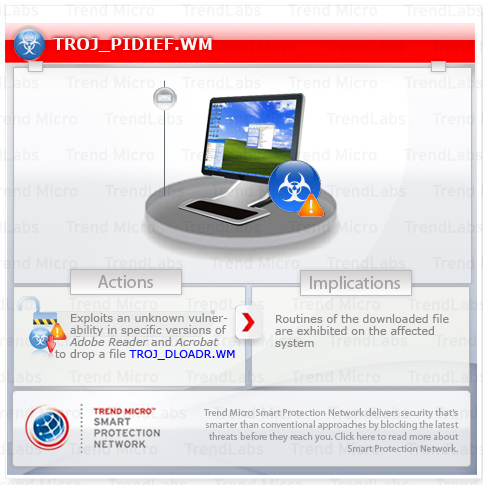TROJ_PIDIEF.WM
Windows 2000, XP, Server 2003


Threat Type: Trojan
Destructiveness: No
Encrypted: Yes
In the wild: Yes
OVERVIEW
Trend Micro has flagged this malware as noteworthy due to the increased potential for damage, propagation, or both, that it possesses. Specifically, it exploits an unknown vulnerability in Adobe Reader and Acrobat to drop another malicious file.
To get a one-glance comprehensive view of the behavior of this Trojan, refer to the Threat Diagram shown below.

This Trojan arrives as an attachment to email messages spammed by other malware/grayware or malicious users.
It executes the dropped file(s). As a result, malicious routines of the dropped files are exhibited on the affected system.
TECHNICAL DETAILS
Arrival Details
This Trojan arrives as an attachment to email messages spammed by other malware/grayware or malicious users.
Autostart Technique
This Trojan drops the following files:
- %User Temp%\hlp.cpl - detected as TROJ_DLOADR.WM
(Note: %User Temp% is the current user's Temp folder, which is usually C:\Documents and Settings\{user name}\Local Settings\Temp on Windows 2000, XP, and Server 2003.)
Dropping Routine
This Trojan takes advantage of the following software vulnerabilities to drop malicious files:
It executes the dropped file(s). As a result, malicious routines of the dropped files are exhibited on the affected system.
Other Details
This Trojan is a zero-day exploit for the following vulnerability:
- Adobe Reader
- Adobe Acrobat
More information on this vulnerability can be found below:
- Adobe Security Bulletin APSA10-02
It does the following:
- Exploits CVE-2010-2883, which exists in Adobe Reader and Acrobat 9.3.4 and earlier versions, that could cause a crash and potentially allow an attacker to execute arbitrary commands on the affected system
SOLUTION
Step 1
For Windows XP and Windows Server 2003 users, before doing any scans, please make sure you disable System Restore to allow full scanning of your computer.
Step 3
Scan your computer with your Trend Micro product to delete files detected as TROJ_PIDIEF.WM. If the detected files have already been cleaned, deleted, or quarantined by your Trend Micro product, no further step is required. You may opt to simply delete the quarantined files. Please check this Knowledge Base page for more information.
Step 4
Download and apply these security patches Refrain from using these products until the appropriate patches have been installed. Trend Micro advises users to download critical patches upon release by vendors.
Did this description help? Tell us how we did.


